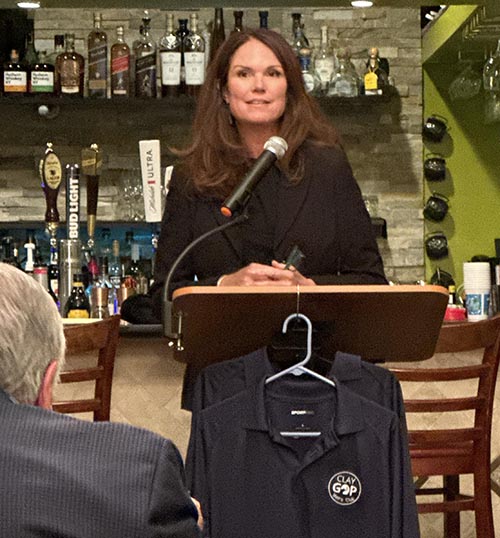State attorney briefs Republican men

BY DAN HILDEBRAN
ClayCivic.com Publisher
State Attorney Melissa Nelson spoke to the Republican Men of Clay County on Wednesday, May 17, in Fleming Island. The Jacksonville-based prosecutor with offices in Clay and Nassau Counties gave club members an overview of crime statistics in Clay County, discussed a recent high-profile murder case, and answered questions from the audience.
Nelson said that despite the growth in Clay County, felony filings are down by a significant percentage.
“Sheriff Cook is doing a great job here,” Nelson told the crowd at Santioni’s Italian Restaurant, “and when I was looking at the filings, they’ve decreased since 2018 by almost 30%, which is pretty remarkable.”
The prosecutor added that the county’s fast growth rate was reflected in a recent murder trial in Green Cove Springs.
She said 95% of the 12-member jury had lived in Clay County for less than five years.
Nelson added that the February trial, that of Michael Renard Jackson, was one of the most important Clay County cases her office has recently prosecuted.
In 2007, Jackson was accused of raping, stabbing, and strangling a 25-year-old veterinary technician at a Wells Road animal clinic before beating her to death with a fire extinguisher.
Three years later, a Clay County jury convicted Jackson for the murder of Andrea Boyer, and the defendant was sentenced to death.
However, the Florida Supreme Court threw out the conviction saying Clay deputies made prejudicial statements.
Nelson said she attended Jackson’s second trial in February and predicted the jury would reach a verdict in 15 minutes.
“After the first day of deliberation,” she said, “six hours, I started to get very, very worried.”
Nelson added that after being sequestered overnight in a hotel, the jury returned the following morning and quickly rendered a guilty verdict.
Nelson said the defendant had a history of sexual assault, beginning when he was only a juvenile,
“The first girl he raped, he crawled in her apartment,” Nelson said. “She was 14 years old; her mom was single, raising three kids in Jacksonville. (He) crawled into her second-story apartment and raped her while her mom was in the apartment. She was getting ready for work; she was showering.”
The prosecutor said Jackson was convicted of the battery and sentenced to 30 years but was released after 14.
Within 12 months of his release, Jackson was accused of rape again, this time in St. Augustine.
A St. Johns County jury acquitted the defendant after he claimed the sex with the alleged victim was consensual.
Nelson said Jackson tried the same defense in the Clay County case, and it almost worked.
“Many of the jurors that talked to us said there was a man who actually believed his story,” Nelson said, “and he was a holdout on the jury who ultimately came around.”
Nelson blamed the 12-year delay between the Supreme Court’s decision to remand the case back to Clay County and Jackson’s second trial on the pandemic, her office’s insistence on seeking the death penalty, and a dispute about DNA evidence discovered on the murder weapon.
She said that the defense sent the fire extinguisher to a private lab, which discovered the defendant’s DNA on the metal cylinder.
Nelson said that after years of litigation over the discovery, the trial court ruled that the DNA on the fire extinguisher was privileged communication between the defendant and his lawyers, and therefore the state could not submit the evidence to the jury.
She said the lack of evidence from the cylinder affected the 12-member panel.
“They knew it was the murder weapon,” she said of jurors, “but there was no discussion about evidence collected from it.”
After Jackson took the witness stand in his own defense, claiming he and the victim were in a romantic relationship, prosecutors called Jackson’s first victim, now 51 years old, to tell jurors about her encounter with the defendant.
Nelson said that although the jury ultimately convicted Jackson, she knew that her team would not be able to get a 12-0 vote for a death penalty recommendation.
Nelson also answered questions from the group about the recent mayoral race in Jacksonville, the impact of George Soros on U.S. prosecutors, Florida’s new laws that most affect her office, the prosecution of rioters in Jacksonville following the death of George Floyd, judicial activism, and the Daniel Penny case in New York.
Melissa Nelson speaks to the Clay Republican Men’s Club on Wednesday, May 17.

